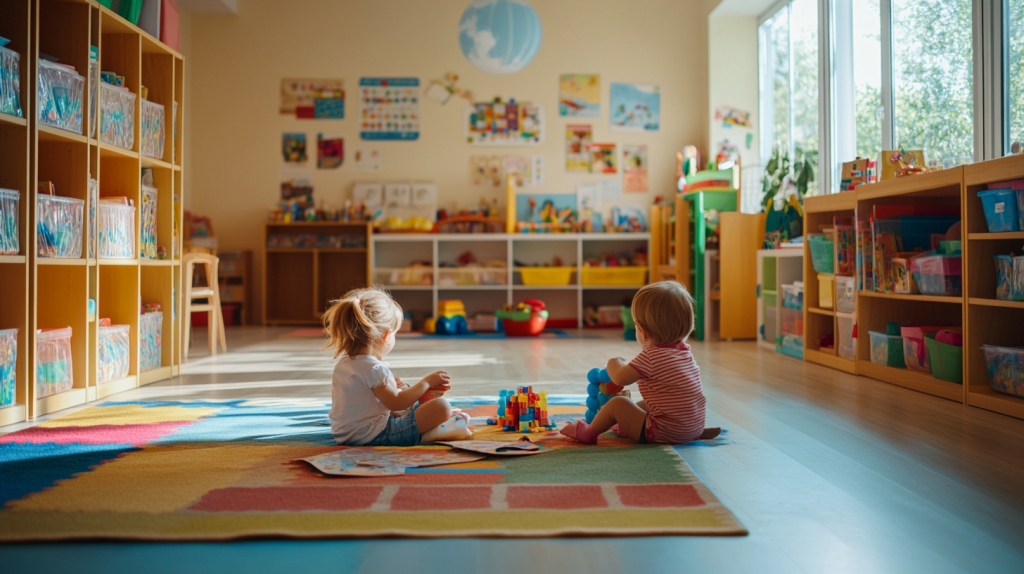Full-time daycare is a comprehensive childcare service designed to cater to the needs of working parents. It typically operates for a full working day, usually from early morning until late afternoon or early evening. These centers provide a structured environment where children can learn, play, and interact with peers while their parents or guardians are at work.
The Basics of Full-Time Daycare
At its core, full-time daycare is a service that provides care and supervision for children throughout the entire workday. These centers often open early in the morning to accommodate working parents and close in the early evening. The aim is to offer a safe and nurturing environment where children can engage in various activities that promote learning and development.
How Many Hours Is Full-Time Daycare?
Full-time daycare generally covers an 8- to 10-hour period each day. Most centers offer care from around 7:00 AM to 6:00 PM, though exact hours can vary. It’s essential to check with your chosen daycare provider about their specific hours of operation. Some centers may offer extended hours to accommodate parents with non-traditional work schedules.
Age Groups and Programs
Daycare centers often cater to a range of age groups, from infants to preschoolers. Each age group typically has its own tailored program designed to meet the developmental needs of the children. For infants, this may include activities that promote sensory development, while programs for older children might focus on pre-academic skills and social interaction.

What Are the Benefits of Full-Time Daycare?
Full-time daycare offers a host of advantages for both children and parents, making it an appealing option for families.
Social Interaction
One of the primary benefits of full-time daycare is the opportunity for children to socialize with their peers. This environment helps children develop essential social skills, such as communication, sharing, and teamwork. Regular interaction with other children can also foster empathy and understanding of diverse perspectives, laying the groundwork for healthy relationships in the future.
Structured Routine
Daycare centers provide a structured routine with set times for activities, meals, and rest. This consistency can help children feel secure and understand daily expectations. A predictable routine also aids in the development of time management skills and helps children transition smoothly between activities.
Educational Activities
Many daycare centers incorporate educational activities and play-based learning into their programs. This early exposure to learning can stimulate cognitive development and prepare children for school. Activities might include arts and crafts, storytelling, and basic math and science exercises, all of which contribute to a well-rounded early education.
Emotional Development
Full-time daycare also supports emotional development by providing a stable and supportive environment. Children learn to express their emotions, manage feelings, and build resilience. Caregivers play a crucial role in guiding children through emotional challenges and promoting a positive self-image.
What Should I Look for in a Daycare Center?
Choosing the right daycare center involves careful consideration of several critical factors to ensure the best fit for your child and family.
Licensing and Accreditation
Ensure the daycare is licensed by the state and, if possible, accredited by a recognized organization. Licensing ensures the center meets basic health and safety standards, while accreditation can indicate higher quality care. Research the accrediting bodies in your area to understand what standards they require and how they evaluate daycare centers.
Staff Qualifications
Inquire about the qualifications and experience of the daycare staff. Look for centers where caregivers have training in early childhood education and CPR/First Aid certification. Experienced staff members are better equipped to handle the diverse needs of children and provide a nurturing and educational environment.
Safety and Cleanliness
Visit the center to assess its safety and cleanliness. Check for secure entrances, safe play areas, and clean facilities. The staff should follow strict hygiene protocols, especially in light of health concerns like COVID-19. Inquire about the center’s cleaning schedule and the measures they take to ensure a germ-free environment.
Curriculum and Activities
Evaluate the daycare’s curriculum and the types of activities offered. A well-rounded program should include a mix of educational, physical, and creative activities. Ask about the balance between structured and unstructured play and how the center adapts activities to suit different age groups.
Communication with Parents
Consider how the daycare communicates with parents. Regular updates on your child’s progress, activities, and any issues are crucial. Look for centers that offer open channels of communication, such as newsletters, parent-teacher meetings, and digital platforms for sharing daily reports.

How Much Does Full-Time Daycare Cost?
The cost of full-time daycare can vary widely depending on location, the age of your child, and the type of facility. On average, parents can expect to pay between $200 to $1,000 per month. Be sure to ask about additional fees for supplies, meals, or late pick-ups.
Factors Influencing Cost
Several factors influence the cost of daycare, including geographic location, the reputation of the center, and the staff-to-child ratio. Urban areas tend to have higher daycare costs compared to rural locations due to higher overhead expenses. Additionally, centers with specialized programs or highly qualified staff may charge premium rates.
Are There Financial Assistance Options?
Many states offer financial assistance programs to help families afford daycare. Check with your local government or the daycare center to see if you qualify for any subsidies or programs. Some employers also offer childcare benefits or flexible spending accounts that can alleviate the financial burden.
Budgeting for Daycare
When budgeting for daycare, consider all potential expenses, including registration fees, supplies, and transportation costs. It’s also wise to plan for unexpected expenses, such as additional childcare during holidays or emergencies. Developing a comprehensive budget can help you manage costs effectively and avoid financial stress.
How Can I Prepare My Child for Daycare?
Starting daycare is a significant transition for your child. Here are some tips to help them adjust smoothly and feel comfortable in their new environment.
Visit the Center Together
Before the first day, visit the daycare with your child to familiarize them with the new environment. Meeting the caregivers and seeing the play areas can help ease first-day jitters. Encourage your child to explore the center and ask questions to build excitement and reduce anxiety.
Establish a Routine
Set a consistent routine at home that aligns with the daycare schedule. This includes regular meal times, nap times, and bedtime to help your child adjust to the new routine. Gradually introduce changes to your child’s schedule a few weeks before starting daycare to ensure a seamless transition.
Encourage Independence
Teach your child basic self-help skills, such as washing hands, using utensils, and putting on shoes. These skills will boost their confidence and help them navigate the daycare environment more independently. Practicing these skills at home can make your child feel more comfortable and capable in a group setting.
Emotional Preparation
Talk to your child about what to expect at daycare and address any concerns they may have. Reading books about starting daycare or attending group playdates can also help prepare them emotionally. Encourage open communication and reassure your child that it’s okay to feel nervous or excited about this new adventure.
What If My Child Gets Sick at Daycare?
Most daycare centers have policies in place for handling sick children. It’s crucial to understand these policies before enrolling your child, as they ensure the well-being of all children and staff.
Sick Child Policy
Typically, a daycare will require a child who is ill to stay home until they are symptom-free for a certain period, usually 24 hours. This policy helps prevent the spread of illness among children and staff. Familiarize yourself with the center’s guidelines on symptoms that necessitate staying home and how they handle outbreaks of contagious illnesses.
Medication Administration
If your child needs medication during the day, check if the daycare staff is authorized to administer it. You may need to provide written permission and instructions for any medications your child requires. Ensure that all medication is clearly labeled with your child’s name and dosage instructions to prevent any mishaps.
Health and Safety Measures
Inquire about the daycare’s health and safety measures, especially in light of recent health concerns. Ask about their protocols for cleaning and disinfecting toys and surfaces, as well as their procedures for handling emergencies. A proactive approach to health and safety can give you peace of mind while your child is in care.
How Do I Communicate with Daycare Staff?
Effective communication with daycare staff is key to a successful experience for both you and your child. Establishing a strong relationship with caregivers ensures that your child’s needs are met and any concerns are promptly addressed.
Daily Updates
Many daycare centers provide daily updates on your child’s activities, meals, and naps. These updates can help you stay informed about your child’s day-to-day experiences. Some centers use digital platforms or apps to share photos and updates in real-time, allowing you to feel connected even when you’re not physically present.
Parent-Teacher Conferences
Some daycares offer regular parent-teacher conferences to discuss your child’s progress and any concerns you may have. Take advantage of these opportunities to maintain open communication with the caregivers. These meetings are an excellent time to discuss developmental milestones, social interactions, and any challenges your child may be facing.
Open Communication Channels
Choose a daycare that encourages open communication and welcomes feedback from parents. Establish a preferred method of communication, whether it’s email, phone calls, or in-person meetings. Regular check-ins with your child’s caregivers can help address any issues early on and strengthen your partnership with the daycare.
Conclusion
Choosing a full-time daycare is a significant decision that requires careful consideration of various factors such as cost, location, and the quality of care provided. By understanding what to look for and how to prepare your child, you can make an informed choice that benefits your family.
Remember to visit potential centers, ask questions, and trust your instincts when selecting the best environment for your child. With the right preparation and communication, full-time daycare can be a positive and enriching experience for your child. The right daycare setting can provide a supportive and stimulating environment that fosters your child’s growth and development, giving you peace of mind as you balance work and family responsibilities.
Contact Discovery Time Learning Center for Full and Part-Time Daycare
Are you ready to give your child a nurturing and enriching daycare experience? Contact Discovery Time Learning Center today to learn more about our full and part-time daycare options. Our dedicated staff is here to support your child’s growth and development in a safe and engaging environment.
Don’t hesitate to reach out for more information or to schedule a visit. Your child’s adventure in learning and socialization awaits!



